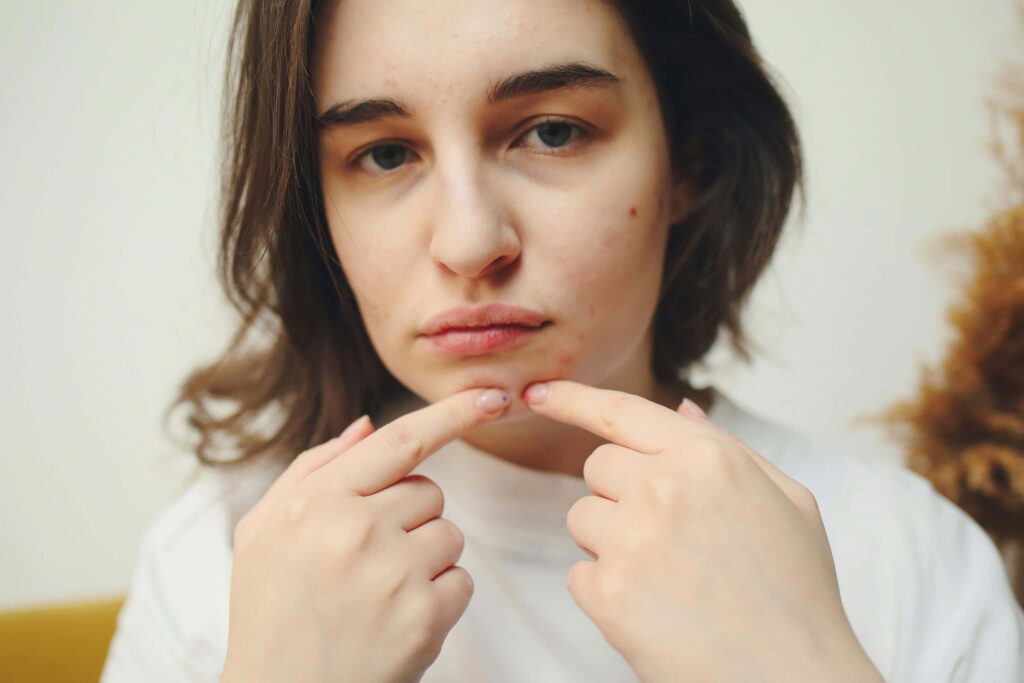The Sneaky Ways Stress Impacts Your Skin
We’ve all been there – deadlines looming, bills piling up, and suddenly your skin decides to throw a tantrum. Coincidence? Not quite. Stress and skin health are more closely linked than you might think. Let’s dive into how your body’s stress response can show up on your face (and everywhere else).

It’s All Connected
When you’re stressed, your body goes into fight-or-flight mode. This triggers a hormonal cascade that can wreak havoc on your skin:
Cortisol: The Stress Hormone’s Skin Effects
- Oily overload: Cortisol tells your skin to pump out more oil, leading to clogged pores and acne breakouts.
- Collagen breakdown: Long-term stress can degrade collagen, leading to premature wrinkles and sagging skin.
- Barrier breakdown: Stress weakens your skin’s protective barrier, making it more sensitive and prone to irritation.
Inflammation Station
Chronic stress keeps your body in a state of low-grade inflammation. This can exacerbate existing skin conditions like eczema, psoriasis, and rosacea.
How Your Skin Tells You It’s Had Enough
- Sudden acne outbreaks: Especially if you don’t usually struggle with acne.
- Dull, tired-looking skin: Stress can interfere with cell turnover, leaving you looking lackluster.
- Increased sensitivity: If your usual products suddenly sting or irritate, stress might be the culprit.
- Slower healing: Notice that cut taking forever to heal? Stress slows down your skin’s repair processes.
Strategies for Healthier Skin
Now that we know how stress messes with our skin, let’s talk solutions. Here are some stress-management techniques that’ll have both your mind and skin breathing a sigh of relief:
Mind-Body Connection: Calming Techniques
Meditation and Mindfulness
Take a few minutes each day to quiet your mind. Here we give tips on how to lower cortisol with mindfulness techniques.
Deep Breathing Exercises
Try the 4-7-8 technique: Inhale for 4 counts, hold for 7, exhale for 8. Repeat a few times when you feel stressed.
Lifestyle Tweaks for Stress Relief
Move Your Body
Exercise releases endorphins, nature’s stress-fighters. Find an activity you enjoy, whether it’s yoga, running, or dancing in your living room.
Prioritize Sleep
Aim for 7-9 hours of quality sleep. Create a relaxing bedtime routine to signal to your body it’s time to wind down.
Nourish Your Body and Skin
Eat a balanced diet rich in antioxidants, omega-3 fatty acids, and vitamins. Your skin will thank you!
Skincare SOS: Stress-Proofing Your Routine
When stress is high, your skincare routine might need some adjustments:
Gentle Cleansing
Switch to a mild, non-foaming cleanser to avoid stripping your already stressed skin.
Hydration Station
Look for moisturizers with ingredients like hyaluronic acid and ceramides to strengthen your skin barrier.
Calming Ingredients
Incorporate products with soothing ingredients like niacinamide, chamomile, or green tea.
Creating Your Stress-Free Sanctuary
Carving out time and space for relaxation is crucial for managing stress and its effects on your skin. Here are some ideas:
- Designate a calm corner: Create a cozy spot in your home dedicated to relaxation.
- Digital detox: Set boundaries around technology use, especially before bed.
- Hobby time: Engage in activities you enjoy that take your mind off stressors.
The Long-Term Outlook: Stress Management for Skin Health
Remember, managing stress is an ongoing process. Be patient with yourself and celebrate small victories. As you incorporate stress-reduction techniques into your daily life, you’ll likely notice improvements not just in your skin, but in your overall well-being. By understanding the connection between stress and your skin, you’re already taking the first step towards a healthier, happier complexion. With consistent effort and self-care, you can help your skin weather life’s stressful storms and maintain that healthy glow.
We recommend that you read Lower Cortisol Naturally with These Effective Mindfulness Techniques and Recognizing Burnout: Essential Signs You Need a Break
